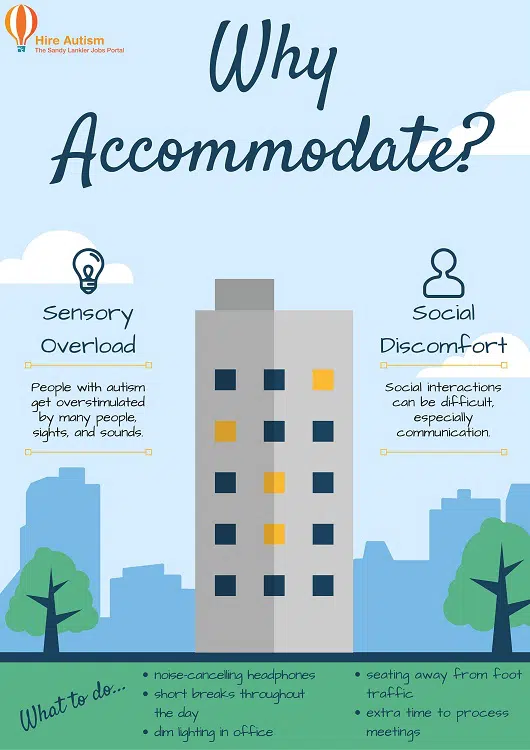It is critical to support your autistic employee in the workplace by providing them with a work environment that allows them to succeed. It is your responsibility to ensure that the needs of your employees are met.
The ADA requires that employers with 15 or more employees follow a certain standard of reasonable accommodations for qualified employees with disabilities. Employees are qualified if they:
- Satisfy the skill, experience, education, any other requirements of the position
- Can perform primary job tasks with or without reasonable accommodation
Reasonable accommodations, as defined by the EEOC, include changes to:
- The job application process
- The work environment or the way the job is done
- Enable the employee to enjoy an equal employment opportunity, including benefits and privileges
Trainings are also available online. Check out the Job Accommodation Network’s multimedia training website to learn more about workplace accommodations.
How should I approach my employee about accommodations they may need?
In many cases, individuals with disabilities are reluctant to reveal details for fear of being stigmatized or misunderstood. You should take steps to ensure that employees with autism feel comfortable disclosing their disability, should they choose to do so, so that you may take steps to best support them in your workplace. In fact, posting on this site is a form of disclosure, which sets the stage for related questions during initial interviews and orientation as to how to make the workplace welcoming and supportive.
Why do autistic individuals need accommodations?
Autism affects each individual differently, often with regard to sensory and social discomforts. It is important to know if your employee is affected in those ways, so you can make the necessary adjustments and modifications. In that way, you ensure that he or she is happy, comfortable, and productive, thus, setting the stage for success in the job and the workplace.
Individuals on the autism spectrum often struggle with sensory overload. In a workplace where many different people, sights, and sounds are present, it is important to offer any employees with autism with sensory issues relief from these situations.
Sensory overload can be caused by stimuli like fluorescent lighting in the office, loud noises associated with machinery and production, or even co-workers’ perfume and cologne.
Ease in social situations or even typical interpersonal social interaction does not typically come easily to individuals on the spectrum. So, they may need more time than some to adjust and assimilate.
They may not be comfortable speaking on the phone or attending large group meetings. They may also require additional time to process information during a presentation. If your employee struggles with communication, it is critical to understand and address their needs upfront and provide them with the required accommodations.
What are some examples of workplace accommodations?
- Noise-cancelling headphones
- Short breaks throughout the day
- Dim lighting
- Seating away from foot traffic to limit background noise
- Extra time during meetings to process information
Although not an accommodation per se, assigning a co-worker as a sponsor or mentor during orientation of the probationary period can be very effective in teaching an autistic employee how the social framework operates and helping them learn to navigate freely within it.


